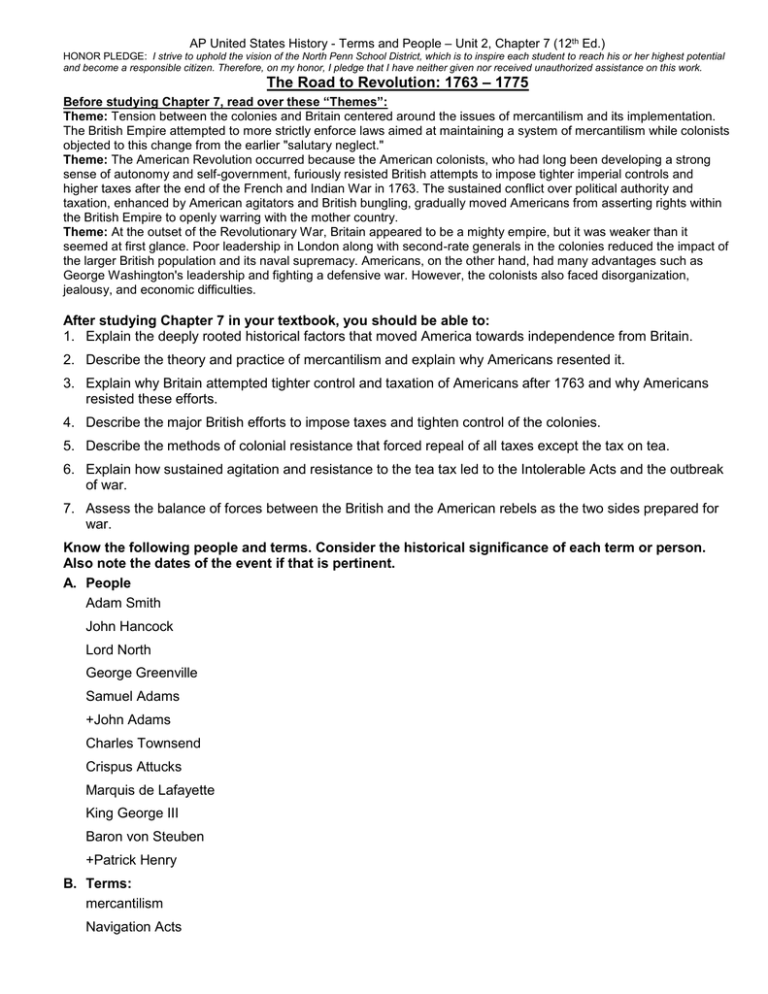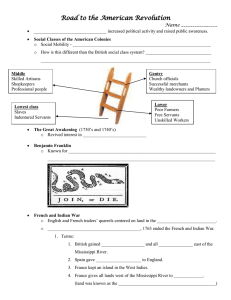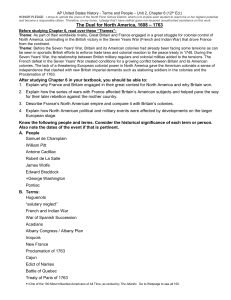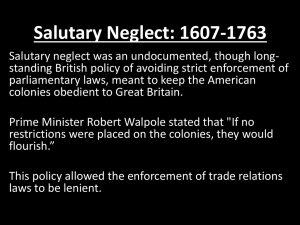– Unit 2, Chapter 7 (12 Ed.)
advertisement

AP United States History - Terms and People – Unit 2, Chapter 7 (12th Ed.) HONOR PLEDGE: I strive to uphold the vision of the North Penn School District, which is to inspire each student to reach his or her highest potential and become a responsible citizen. Therefore, on my honor, I pledge that I have neither given nor received unauthorized assistance on this work. The Road to Revolution: 1763 – 1775 Before studying Chapter 7, read over these “Themes”: Theme: Tension between the colonies and Britain centered around the issues of mercantilism and its implementation. The British Empire attempted to more strictly enforce laws aimed at maintaining a system of mercantilism while colonists objected to this change from the earlier "salutary neglect." Theme: The American Revolution occurred because the American colonists, who had long been developing a strong sense of autonomy and self-government, furiously resisted British attempts to impose tighter imperial controls and higher taxes after the end of the French and Indian War in 1763. The sustained conflict over political authority and taxation, enhanced by American agitators and British bungling, gradually moved Americans from asserting rights within the British Empire to openly warring with the mother country. Theme: At the outset of the Revolutionary War, Britain appeared to be a mighty empire, but it was weaker than it seemed at first glance. Poor leadership in London along with second-rate generals in the colonies reduced the impact of the larger British population and its naval supremacy. Americans, on the other hand, had many advantages such as George Washington's leadership and fighting a defensive war. However, the colonists also faced disorganization, jealousy, and economic difficulties. After studying Chapter 7 in your textbook, you should be able to: 1. Explain the deeply rooted historical factors that moved America towards independence from Britain. 2. Describe the theory and practice of mercantilism and explain why Americans resented it. 3. Explain why Britain attempted tighter control and taxation of Americans after 1763 and why Americans resisted these efforts. 4. Describe the major British efforts to impose taxes and tighten control of the colonies. 5. Describe the methods of colonial resistance that forced repeal of all taxes except the tax on tea. 6. Explain how sustained agitation and resistance to the tea tax led to the Intolerable Acts and the outbreak of war. 7. Assess the balance of forces between the British and the American rebels as the two sides prepared for war. Know the following people and terms. Consider the historical significance of each term or person. Also note the dates of the event if that is pertinent. A. People Adam Smith John Hancock Lord North George Greenville Samuel Adams +John Adams Charles Townsend Crispus Attucks Marquis de Lafayette King George III Baron von Steuben +Patrick Henry B. Terms: mercantilism Navigation Acts AP United States History - Terms and People – Unit 2, Chapter 7 (12th Ed.) HONOR PLEDGE: I strive to uphold the vision of the North Penn School District, which is to inspire each student to reach his or her highest potential and become a responsible citizen. Therefore, on my honor, I pledge that I have neither given nor received unauthorized assistance on this work. “No taxation without representation” “virtual” representation nonimportation agreement “royal veto” internal/external taxation boycott “radical Whigs” Board of Trade Sons of Liberty Declaratory Act First Continental Congress Sugar Act Townshend Acts Quartering Act Boston “Massacre” Who defended in court the British soldiers charged with the “massacre”? __________ The Association Stamp Act committees of correspondence Hessians Admiralty courts Boston Tea Party Loyalists Stamp Act Congress Intolerable Acts “Continental” +=One of the 100 Most Influential Americans of All Time, as ranked by The Atlantic. Go to Webpage to see all 100. C. Sample Essay: Using what you have previously learned and what you learned in Chapter 7, you should be able to answer an essay such as this one: It might be said that it was the British who were revolutionaries in 1763 and the colonists who were conservatives attempting to preserve the status quo. Explain. D. Voices from the past: Gentlemen may cry, Peace, Peace-- but there is no peace. The war is actually begun! The next gale that sweeps from the north will bring to our ears the clash of resounding arms! Our brethren are already in the field! Why stand we here idle? What is it that gentlemen wish? What would they have? Is life so dear, or peace so sweet, as to be purchased at the price of chains and slavery? Forbid it, Almighty God! I know not what course others may take; but as for me, give me liberty or give me death! +Patrick Henry, March 23, 1775 In a speech to the Virginia House of Burgess at St. John's Church in Richmond, where the legislature was meeting






